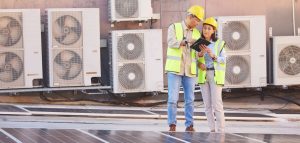
To date, nearly 160,000 heat pump installations have been supported by federal funding
BRITISH COLUMBIA – In the energy sector, green is clean.
The provincial and federal government believe so, and are pushing British Columbians to take advantage of various initiatives aimed towards clean energy innovation, economic resilience and environmental sustainability.
The “Powering Our Future” clean energy program, announced in June, has received strong support from the Clean Energy Association of British Columbia (CEBC).
CEBC states program prioritizes the expansion of BC’s electricity grid and commits to issuing regular calls for power every two years. Committing to regular calls for power sends a strong and necessary signal to the renewable power sector to invest and advance utility-scale clean electricity projects in BC.
It adds that it also provides certainty to industries of all types that BC will have the power needed for major projects. This approach will help rapidly grow our electrical grid and economy to ensure diversified, affordable, reliable, and clean power is available to British Columbians.
“By prioritizing collaborative initiatives with First Nations and industry, BC is paving the way for a future where clean energy innovation drives economic growth and environmental stewardship,” says Kwatuuma Cole Sayers, Executive Director of CEBC. “Investments in renewable energy projects not only enhance our competitive edge but also ensure long-term sustainability, positioning BC as a leader in the global clean energy transition. The new ‘Powering our Future’ clean energy plan is an encouraging next step in bolstering BC’s status as a clean energy superpower, leveraging the decreasing cost of renewables to create a competitive clean economy founded on good jobs, meaningful reconciliation, and affordable clean electricity.”

Each year, a CGHG household will save an average of nearly $400 on their energy bills and reduce their emissions by 1.18 tonnes of CO2.
CEBC notes that the plan also emphasizes the importance of building an economy powered by clean energy, creating new opportunities for people and communities across the province, including First Nations that are already leaders in the clean energy sector.
In June, the $800 million Canada Greener Homes Affordability Program, part of the Canada Green Buildings Strategy (CGBS), was introduced, part of the federal government’s vision and next steps to improve energy efficiency in Canada’s homes and buildings.
This new program will replace the Canada Greener Homes Grant (CGHG) with more comprehensive support for the installation of retrofits, at no charge to participating households. Using a “direct install” model, where the retrofits are managed and delivered by third parties, this program could provide participating households with support up to four times more valuable than the former grant program. Recommended retrofits will be determined by experienced energy efficiency professionals, enabling each participant to receive what their home needs and making their homes more affordable and comfortable.
The CGHAP builds on the progress made to date through the CGHG, which has already helped 240,000 homeowners install heat pumps, windows and doors and insulation through an average grant of $4,400 per household. Each year, a CGHG household will save an average of nearly $400 on their energy bills and reduce their emissions by 1.18 tonnes of CO2. Over the next couple of years, the CGHG will continue to help hundreds of thousands more program participants complete retrofit projects that will further reduce emissions and energy consumption.
In addition to CGHAP, the Oil to Heat Pump Affordability program and the Canada Greener Homes Loan will continue to help Canadians reduce their home energy costs and make the switch to electric heat pumps. To date, nearly 160,000 heat pump installations have been supported by federal funding. Switching to a cold climate electric heat pump will have a significant impact on households that are fully heating with oil, as they could save from $1,500 to $4,500 per year on their home energy bills.
In May, the federal government announced an investment of up to $103.7 million from Canada’s Low Carbon Economy Fund (LCEF) and the Oil to Heat Pump Affordability(OHPA) program, while the province of BC also announced an investment of up to $151 million toward the initiative.
Funding from Environment and Climate Change Canada and Natural Resources Canada will be used to provide grants to enable residents to switch their home heating systems from oil, propane, or natural gas to cleaner heating and cooling options. Funding will also enable building upgrades for low and middle-income homeowners and tenants through the CleanBC Better Homes Energy Savings Program, which aims to support low- and middle-income households installing heat pumps and reducing their energy bills.

As part of the Oil to Heat Pump Affordability program, low and middle-income applicants could receive a rebate of up to $16,000 to switch to high-efficiency heat pumps in homes currently heated with oil. With the support of the Low Carbon Economy Fund, these changes will also apply to homes heated with natural gas and propane. This is an increase in support of approximately 70 percent from BC’s existing rebate program.
Those who are eligible and living in northern British Columbia can access up to an additional $3,000 toward the installation of a heat pump. Homes that require an electrical system upgrade can also qualify for a rebate of up to $5,000 to complete this work.
The funding announced could help applicants receive a total of up to $24,000 to cover the costs of a heat pump installation, including electrical upgrades. On average, homeowners who switch from oil to cold-climate heat pumps to heat their homes save between $1,500 and $4,700 per year on home energy bills.
The number of households in British Columbia with heat pumps has increased by approximately 80 percent since 2017, from an estimated 142,000 to 254,000. In 2022, for the first time ever, the number of heat pumps shipped to British Columbia (37,800) exceeded the number of natural gas furnaces shipped to British Columbia (30,700).
Business Examiner Staff


